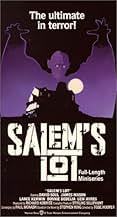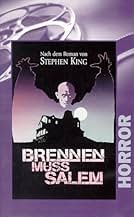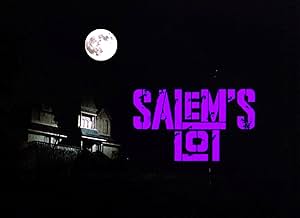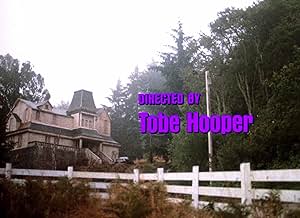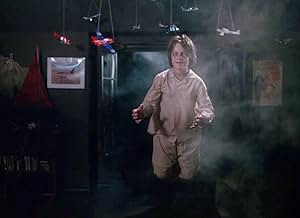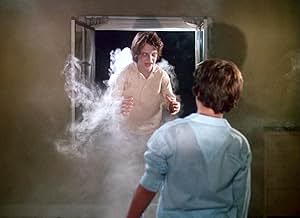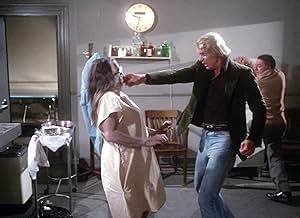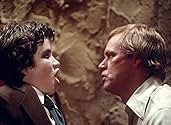Un romanziere e un giovane fan dell'horror tentano di salvare una cittadina del New England che è stata invasa dai vampiri.Un romanziere e un giovane fan dell'horror tentano di salvare una cittadina del New England che è stata invasa dai vampiri.Un romanziere e un giovane fan dell'horror tentano di salvare una cittadina del New England che è stata invasa dai vampiri.
- 3 प्राइमटाइम एमी के लिए नामांकित
- 4 कुल नामांकन
एपिसोड ब्राउज़ करें
फ़ीचर्ड समीक्षाएं
I was fourteen years old when this film was released, and it was really a shocker for its time. Although I can see the points raised by detractors of this film, nevertheless, it is, in my opinion, one of the most truly terrifying movies I have ever seen. The scenes in which first Ralphie and then Danny Glick appear in windows at night, scratching to be let in, were utterly horrifying, as were the scenes with Mike Ryerson in Jason Burke's guest bedroom ("Looooook at me ... I will see you sleep like the dead, teacher") and Marjorie Glick in the mortuary. Along with the original "Halloween," this is a film that really, really scared me, and I feel that a key element was the lack of gore (which is probably a disappointment to younger viewers used to explicit splatter). The nonverbal dialogue of expressions and actions, the music, and the significantly occurring silences resulted in the suspense which makes a film truly frightening in my opinion.
Having said this, I do feel that the book was much, much better than the movie, and I would recommend it as one of the best vampire stories ever written (sorry, Anne Rice, but it's true). But let's be fair and realistic. It's a rare film that excels the book on which it was based. Not one of Stephen King's wonderfully (and horribly) imaginative works has EVER been committed to film in a way that has equaled the written work. Never, ever, EVER. That is something that will just never happen. If it were possible, then nobody would bother to read his books, he would become a screenwriter, and that would be a real loss for the horror genre.
Having said this, I do feel that the book was much, much better than the movie, and I would recommend it as one of the best vampire stories ever written (sorry, Anne Rice, but it's true). But let's be fair and realistic. It's a rare film that excels the book on which it was based. Not one of Stephen King's wonderfully (and horribly) imaginative works has EVER been committed to film in a way that has equaled the written work. Never, ever, EVER. That is something that will just never happen. If it were possible, then nobody would bother to read his books, he would become a screenwriter, and that would be a real loss for the horror genre.
Without a doubt this television movie based on Stephen King's grand horror opus pales in comparison to its literary counterpart. But isn't that usually the case? Although missing some subplots, many characters, and having some major script changes here and there, Tobe Hooper's Salem's Lot is indeed enjoyable. I watched it right after having read the book, and although I spent a lot of time seeing what it did not have...I have to confess that there were many good points. For starters, let me list some of my major complaints. The whole framed narrative story in the movie is ridiculous and very clumsily made. I also have a big problem with the gaping holes in the script with regard to characters popping up here and there with little or no expository introduction. Some characters were used to help move the plot and then discarded. Names were needlessly changed from the novel. That being said there was a great sense of style to the picture which must be credited to Hooper. Overall the acting is quite good. David Soul is very credible in his leading role, as are Lance Kerwin, Bonnie Bedelia, Lew Ayres and Ed Flanders. James Mason makes a stunning villain. Mason uses charm as a weapon and eats up the scenery with subtlety and wit. The vampire is played by horror veteran Reggie Nalder, and although he says not one word...he is very effective. The make-up on him is very reminiscent of Nosferatu. The lead-ins to commercials show the film to be dated by today's standards, but it has enough in it to be an entertaining diversion. However, PLEASE read the book first as it is one of the best of its kind and will make the film all the more enjoyable if for no other reason than seeing its defects.
This movie is not for those people who want to watch busty teenager chicks get slashed and stabbed to death by tall guys with hockey masks and machetes. For that kind of elevated thrill, rent "Summer Camp 5" or something. But for those of you who want a horror movie worthy of the name, rent "Salem's Lot:the mini series". This series scared the hell out of me when I was younger, and very little has changed. David Soul gives the performance of his career as writer Ben Mears and absolutely becomes the character. James Mason is genuinely chilling as Straker, the humorous but not quite well intentioned antiques salesman and, uh...'partner' of Mr. Barlow, aka Nosferatu. I've never seen a horror movie that builds up an atmosphere of suspense and fear as effectively as this one does. It is true that King didn't like it, and as far as I'm concerned that's more to its credit--let's remember that this is the guy behind that illustrious cinematic masterpiece "Maximum Overdrive". The book is one more trashy vampire novel among many, as forgettable as it is trite. Hooper transforms King's boring,oh-it's-just-Dracula-again run of the mill vampire into a mysterious, terrifying monster in the tradition of authentic horror. Don't just watch it, buy it. A necessity.
I recently read Stephen Kings novel (one of his first major successes), so I thought of checking out this mini-series. It's by now more than 40 years old, and that of course shows. The pace is slower than we are now used to (the overlong almost three and a half hours didn't help with that) and the special effects are modest.
But director Tobe Hooper created a pleasantly creepy atmosphere, building up the tension gradually but very effectively; the photography is at times great (the scene of the undertaker on the graveyard for instance); the eerie musical score is exactly right; and there is some solid acting, especially by David Soul and by old school actor James Mason, who excels in his aloof and over-civilized attitude. Some scenes, like the floating vampires by the windows, now make a rather simple impression, but the make-up of the master vampire, like a Nosferatu in colour, is absolutely top-notch scary!
The series follows the novel pretty closely, they only brought back the amount of characters a bit, probably to keep everything more surveyable. The epilogue is essentially different from the book and comes a bit out of the blue, but as an (open) closure to the movie it worked fine enough.
But director Tobe Hooper created a pleasantly creepy atmosphere, building up the tension gradually but very effectively; the photography is at times great (the scene of the undertaker on the graveyard for instance); the eerie musical score is exactly right; and there is some solid acting, especially by David Soul and by old school actor James Mason, who excels in his aloof and over-civilized attitude. Some scenes, like the floating vampires by the windows, now make a rather simple impression, but the make-up of the master vampire, like a Nosferatu in colour, is absolutely top-notch scary!
The series follows the novel pretty closely, they only brought back the amount of characters a bit, probably to keep everything more surveyable. The epilogue is essentially different from the book and comes a bit out of the blue, but as an (open) closure to the movie it worked fine enough.
This is one of the most richly atmospheric films in horror, an article of pure latenight seduction and phosphorescent darkness.
Atmospheric not in the sense that a dry ice machine has pumped a catacomb full of haze and cobwebs are strategically placed in some dark corner, but as a place lived, with naturally dark corners and tangible portents: the old dark house on the hill breathing evil, the antique shop downtown, all velvety smell and musty colors, the small town lined with porticoes bathed in the quiet of a lazy night, yet harboring secrets and vice from inside. Prying eyes staring from behind a curtain.
Oh, at some point vampires come flying through the window, and it's still fine by me, it's one of the better vampire films and at 3 hours it's better fleshed than most of them; but I am just not attuned to the whole vampire lore so I leave this part to be enjoyed best by the traditional horror fan. It is actually one of the more potent retellings of the most familiar story in this field, I was pleasantly surprised to see that it was not quite Dracula but that older film with longer shadows, so I will not spoil the discovery for you.
But the first part intrigues me in stranger ways, more suggestive, with menace that goes unspoken. The small-town facade that would later resurface in Twin Peaks.
There is a notion that matters in all this, but which is not pursued at all; the writer who feels from his perspective that it was his presence that awakened evil, it's fitting that it's coming from a writer because it's a self-centered, imaginative notion, but which from our end we know is bogus. Evil was already afoot, and was never centered around him. But he wistfully imagines himself at the center so he can write about it.
So I don't know what happened with Tobe Hooper. He was never very elegant with a camera, the way Argento was or occasionally Carpenter, but he was unmatched in his feel for the aural qualities of film. He could make a room hum with evil. My guess is that, being an intuitive maker, the feel came and went, or he forgot how to tap into it (you can see as early as Eaten Alive how he seems to be desperately trying to capture again the muse that gave him Texas Massacre). Or he plainly stopped actively chasing after the right material.
This was just right for him. Only Kubrick has better adapted Stephen King to my mind.
Atmospheric not in the sense that a dry ice machine has pumped a catacomb full of haze and cobwebs are strategically placed in some dark corner, but as a place lived, with naturally dark corners and tangible portents: the old dark house on the hill breathing evil, the antique shop downtown, all velvety smell and musty colors, the small town lined with porticoes bathed in the quiet of a lazy night, yet harboring secrets and vice from inside. Prying eyes staring from behind a curtain.
Oh, at some point vampires come flying through the window, and it's still fine by me, it's one of the better vampire films and at 3 hours it's better fleshed than most of them; but I am just not attuned to the whole vampire lore so I leave this part to be enjoyed best by the traditional horror fan. It is actually one of the more potent retellings of the most familiar story in this field, I was pleasantly surprised to see that it was not quite Dracula but that older film with longer shadows, so I will not spoil the discovery for you.
But the first part intrigues me in stranger ways, more suggestive, with menace that goes unspoken. The small-town facade that would later resurface in Twin Peaks.
There is a notion that matters in all this, but which is not pursued at all; the writer who feels from his perspective that it was his presence that awakened evil, it's fitting that it's coming from a writer because it's a self-centered, imaginative notion, but which from our end we know is bogus. Evil was already afoot, and was never centered around him. But he wistfully imagines himself at the center so he can write about it.
So I don't know what happened with Tobe Hooper. He was never very elegant with a camera, the way Argento was or occasionally Carpenter, but he was unmatched in his feel for the aural qualities of film. He could make a room hum with evil. My guess is that, being an intuitive maker, the feel came and went, or he forgot how to tap into it (you can see as early as Eaten Alive how he seems to be desperately trying to capture again the muse that gave him Texas Massacre). Or he plainly stopped actively chasing after the right material.
This was just right for him. Only Kubrick has better adapted Stephen King to my mind.
Stephen King Movies Ranked by IMDb Rating
Stephen King Movies Ranked by IMDb Rating
See how IMDb users rank the feature films based on the work of Stephen King.
क्या आपको पता है
- ट्रिवियाThe exterior for the Marsten House was actually a full-scale facade built upon a smaller pre-existing hill-top house. In total, the facade cost the production an estimated $100,000 dollars to build. In 1979, an entire house (including the interiors) could have been made for that amount.
- गूफ़When the younger Glick brother is abducted (and later presumably murdered by Barlow) he's wearing a jacket, t-shirt, dungarees and sneakers. After which, he appears to his brother wearing pajamas.
- क्रेज़ी क्रेडिटThe text of the opening credits appear and dissolve piece by piece into each other in a jigsaw puzzle fashion.
- इसके अलावा अन्य वर्जनSalem's Lot originally aired as a two-night mini-series with the first episode airing on 17 November 1979 and the second episode airing the following week on 24 November 1979.
टॉप पसंद
रेटिंग देने के लिए साइन-इन करें और वैयक्तिकृत सुझावों के लिए वॉचलिस्ट करें
विवरण
इस पेज में योगदान दें
किसी बदलाव का सुझाव दें या अनुपलब्ध कॉन्टेंट जोड़ें



